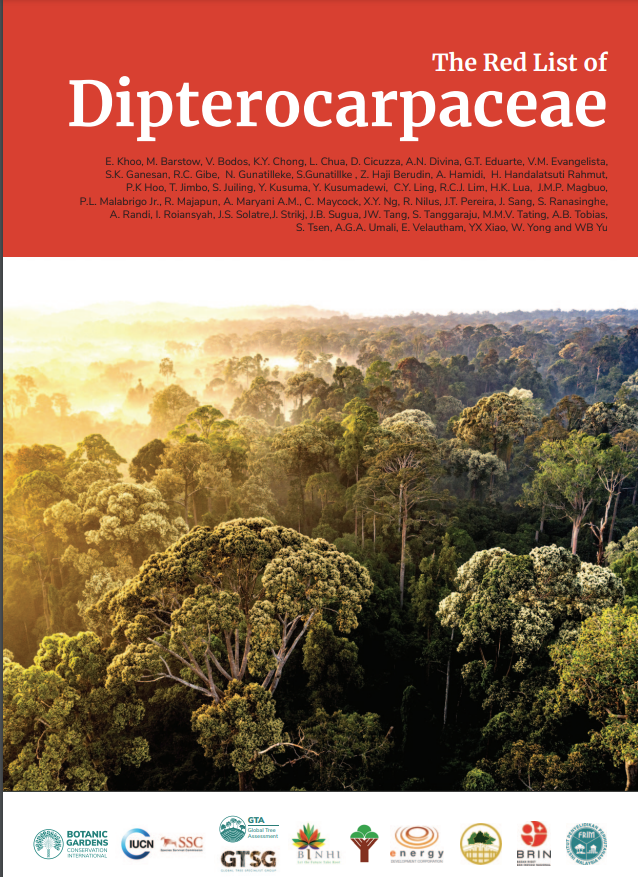The Red List of Dipterocarpaceae published after global assessment effort
-
Region
Global -
Programme
BGCI -
Workstream
Saving Plants -
Topic
Tree Conservation -
Type
Press Release -
Source
BGCI
News published: 03 March 2023
The Red List of Dipterocarpaceae is published today, following the efforts of over 50 individuals, from over 15 organisations, from across the global range of dipterocarps. Efforts began in 2019, with two assessment workshops hosted since this time. The Red List of Dipterocarpaceae contains analysis of all 535 species of Dipterocarpaceae and builds on national and regional red list publications.

The report finds that:
- 357 (67%) species of Dipterocarpaceae are Threatened in the wild.
- 70 species are assessed as Critically Endangered, one species, Hopea shingkeng, is already assessed as Extinct.
- Indonesia and Malaysia are home to the greatest number of dipterocarp species (278 and 340 species respectively), consequently, these two countries also contain the highest numbers of threatened species (168 and 211 species respectively).
- Sri Lanka and India have comparatively fewer species, but a higher proportion of threat is observed (61 native and 58 Threatened for Sri Lanka/ 31 native and 30 Threatened for India).
- Analyses found 201 single country endemics, of which 84% are Threatened in the wild.
- 22 species are Data Deficient, indicating more information is needed.
Conversion of land for agriculture is the major threat to Dipterocarpaceae, impacting over 400 species. The most recorded agricultural threat is conversion for industrial plantations. Unmanaged logging and wood harvesting is the second major threat to dipterocarps, as they have historically been over-exploited for use as timber. Fire and climate change are emerging threats which are interlinked.
The Red List of Dipterocarpaceae, is one of the largest red list publications released by BGCI to date in terms of scope and also international contribution. This report is the first to include country pages. These short reports provide an overview of dipterocarps in eight countries where they are native. This will give readers an introduction to the forest management regime, strength, conservation measures in-place, and cross institutional links that are currently in-action. Therefore, The Red List of Dipterocarpaceae provides both a global and national perspective on the conservation of dipterocarps.
With 67% of dipterocarps Threatened, and even more species experiencing a population decline (even not threatened species), prioritising conservation action for this family needs thoughtful consideration. Already ex situ and in situ conservation are in place for dipterocarps. The report finds that a total of 379 species, representing 71% of dipterocarp species are recorded in at least one in situ conservation site, including 237 Threatened species. Conversely, over 60% of Dipterocarpaceae are not known from ex situ collections.
Beyond these activities, there is success in conserving dipterocarps through Sustainable Forest Management schemes, forestry nurseries, and monitoring plots. These methods are discussed in greater detail within the country pages of the report. Partners who contributed to the report are hubs of research for Dipterocarpaceae, investigating the productivity of forests after logging, species modelling in response to climate change and leading surveys of dipterocarp populations in the wild.
The Red List of Dipterocarpaceae aims to mobilise the international plant community to take notice and help expand and maintain conservation activities for dipterocarps. To build upon the foundation established through existing work, the Global Conservation Consortium (GCC) for Dipterocarpaceae was set up in 2020 with the aim to build a support network among the Dipterocarpaceae research community.
About Dipterocarpaceae
Dipterocarpaceae, commonly known as dipterocarps, is an abundant tree family. The centre of diversity is in Southeast Asia, where they make up a significant proportion of the forest biomass. Aside from the ecological role the family plays, it is highly valued for its timber and other products such as oleoresins and oils. As a result, of the socioeconomic value of Dipterocarpaceae and land use change within the region, the family has therefore been put at significant risk in the wild.
About BGCI and The Global Tree Assessment (GTA)
BGCI (Botanic Garden Conservation International) is a membership organisation, representing botanic gardens and plant conservation in more than 100 countries across the globe. It is an independent UK charity established in 1987 and aims to support and empower members and the wider conservation community, so that knowledge and expertise can be applied to reversing the threat of extinction facing plants globally. Their mission is to mobilise botanic gardens and engage partners in securing plant diversity for the wellbeing of people and planet.
The Global Tree Assessment (GTA) is working towards producing conservation assessments for all the World’s tree species. After publishing the globally significant report The State of the World’s Trees in 2021, they have concluded that over 80% of all trees have a published conservation assessment. The Red List of Dipterocarpaceae is the latest publication in this incredible project.
Additional successes of the GTA include the implementation of rapid assessment methodology for trees of low conservation concern and the completion of assessments for tree species in Madagascar, Europe, and North Africa, alongside species group assessments including Acer, Nothofagus, Theaceae, Fraxinus, Magnoliaceae, and Betulaceae.
Learn more (GTA):
- Website: https://www.bgci.org/our-work/networks/gta/
- Twitter: https://twitter.com/gta_gtsg
List of key partners for The Red List of Dipterocarpaceae:
- Forest Research Institute Malaysia (FRIM)
- Sabah Forestry Department (SFD)
- Forest Department Sarawak (FDS)
- National Research and Innovation Agency (BRIN)
- Energy Development Corporation (EDC)
- Universiti Malaysia Sabah (UMS)
- Forever Sabah (FS)
- Jawaharlal Nehru Tropical Botanic Garden and Research Institute (JNTBGRI)
- Arboretum Sylva Universitas Tanjungpura
- Fauna & Flora International (FFI) Indonesia Programme
For more information about The Red List of Dipterocarpaceae please contact:
Megan Barstow, Conservation Officer (GTA) at BGCI
Support BGCI
You can support our plant conservation efforts by sponsoring membership for small botanic gardens, contributing to the Global Botanic Garden Fund, and more!
Conservation Action Tracker
BGCI’s Conservation Action Tracker provides information on conservation actions for tree species.